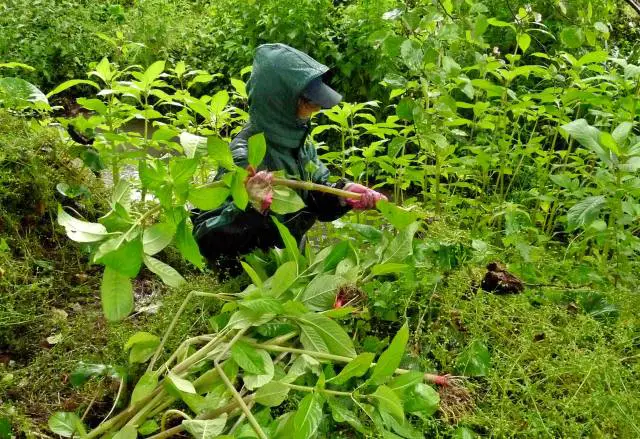Thanks to Claire from Natural Enterprise for details of this volunteer appeal. In her own words. Ed
The Plant Positive project needs your help to tackle some of the non-native plant species on our rivers and ponds this summer!
Walking or cycling along our rivers in summertime, we can’t fail to notice that many of our rivers and streams (both the Eastern Yar and the Wroxall stream, and in parts, the Medina) are now almost uniformly covered in the Barbie doll pink blossom of the non-native plant Himalayan balsam.
It’s an invasive species
While Himalayan balsam is not without its place in the world, it is an invasive species in the UK, out-pollinating and out-shading our native flora and threatening the extraordinary biodiversity of our river habitats.
A single stretch of river could be crammed with as many as 25 different native species of plants, such beautiful plants as purple loose-strife, water mint, meadowsweet and greater willow herb; sadly many if not all of these can disappear under the march of this single species! And as an annual, Himalayan balsam dies back in winter, leaving our riverbanks bare and vulnerable to erosion and increased flooding.
Decline of the water vole
As we have seen recently from the Wildlife Trust’s reports, this loss of plant diversity and bank erosion is also contributing significantly to the decline of one of the UK’s rarest mammals, the water vole.
Claire Hector, Plant Positive project co-ordinator at Natural Enterprise, explains, “We have a three-pronged approach planned for our rivers this summer. Pulling Himalayan balsam out at the root before it has a chance to seed helps control and eventually eradicate the plant once the seed bank is exhausted.
“This combined with some spraying and cutting in other areas that are more difficult to access and potentially unsafe for volunteers should help to significantly reduce the presence of balsam and break the back of its infestation”
Herbicide treatment
The carefully targeted herbicide treatment is licensed and controlled by the Environment Agency and uses only a safe and short-lived application which breaks down immediately in soil and water.
“We’d love as many volunteers as possible to join up for balsam-pulling so that we can keep up a sustained attack all summer! It’s an easy job, lots of fun and a great excuse to work outside in some of our loveliest river-side spots! We’ll be concentrating on the Wroxall, parts of the E. Yar and the Medina, while our colleagues at the Wildlife Trust and their volunteers will be working towards us from their reserves towards the Sandown end of the Yar.”
Get in touch
If you would like to give a hand Himalayan Balsam-pulling this summer, please contact Claire Hector on 01983 201566 or claire.hector@naturalenterprise.co.uk. No experience necessary as training will be given on the day.
You could also join Plant Positive and the Wildlife Trust on their Bee Spotting and Balsam Pulling walk on Thursday 23rd May – see HIWWT Summer Walks booklet (in your local library) or contact Claire for more details. Plant Positive would also like to speak to all the riparian landowner in either the E. Yar or Medina catchment, so please do also get in touch.




